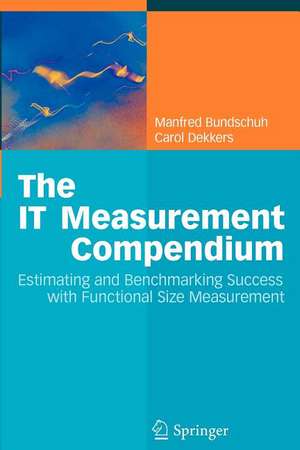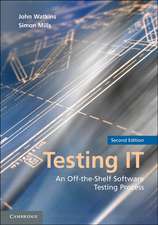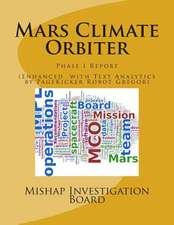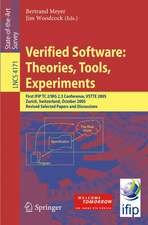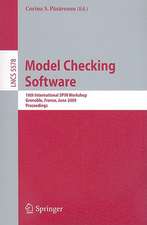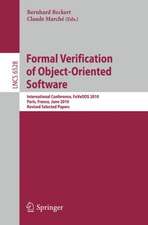The IT Measurement Compendium: Estimating and Benchmarking Success with Functional Size Measurement
Autor Manfred Bundschuh, Carol Dekkersen Limba Engleză Paperback – 14 oct 2010
| Toate formatele și edițiile | Preț | Express |
|---|---|---|
| Paperback (1) | 379.66 lei 43-57 zile | |
| Springer Berlin, Heidelberg – 14 oct 2010 | 379.66 lei 43-57 zile | |
| Hardback (1) | 363.41 lei 43-57 zile | |
| Springer Berlin, Heidelberg – 9 sep 2008 | 363.41 lei 43-57 zile |
Preț: 379.66 lei
Preț vechi: 474.57 lei
-20% Nou
Puncte Express: 569
Preț estimativ în valută:
72.66€ • 75.66$ • 61.41£
72.66€ • 75.66$ • 61.41£
Carte tipărită la comandă
Livrare economică 10-24 martie
Preluare comenzi: 021 569.72.76
Specificații
ISBN-13: 9783642087868
ISBN-10: 3642087868
Pagini: 680
Ilustrații: XXXVI, 644 p. 134 illus.
Dimensiuni: 155 x 235 x 36 mm
Greutate: 0.93 kg
Ediția:Softcover reprint of hardcover 1st ed. 2008
Editura: Springer Berlin, Heidelberg
Colecția Springer
Locul publicării:Berlin, Heidelberg, Germany
ISBN-10: 3642087868
Pagini: 680
Ilustrații: XXXVI, 644 p. 134 illus.
Dimensiuni: 155 x 235 x 36 mm
Greutate: 0.93 kg
Ediția:Softcover reprint of hardcover 1st ed. 2008
Editura: Springer Berlin, Heidelberg
Colecția Springer
Locul publicării:Berlin, Heidelberg, Germany
Public țintă
Professional/practitionerCuprins
The Estimation Challenges.- Estimation Fundamentals.- Prerequisites for Estimation.- The Implementation of Estimation.- Estimation Methods.- Estimating Maintenance Effort.- Software Measurement and Metrics: Fundamentals.- Product- and Process- Metrics.- Object-Oriented Metrics.- Measurement Communities and Resources.- Benchmarking of IT Projects.- The IFPUG Function Point Counting Method.- Functional Size Measurement Methods (FSMMs).- Variants of the IFPUG Function Point Counting Method.- Using Functional Size Measurement Methods.- Estimation of Data Warehouses, Web-Based Applications: Software Reuse and Redevelopment.- IFPUG Function Point Counting Rules.- Functional Size Measurement Case Studies.- Functional Size Measurement: Additional Case Studies.- Tools for Estimation.
Recenzii
"This is a most useful and practical book. It should be on every project manager's desk as a handy reference on all things dealing with software measurement, estimation, benchmarking, and process improvement. Easy to read, easy to understand, and easy to apply !"
Peter R. Hill, CEO, International Software Benchmarking Standards Group
"Carol Dekkers and Manfred Bundschuh have written an excellent book that should be added to the collections of all software managers and software metrics workers throughout the world.
Measurement and estimation of software projects has been extremely difficult for both technical and sociological reasons. The technical reasons include scores of poorly defined and incompatible metrics, gaps or "leakage" from historical data, and a rather sparse collection of accurate benchmarks that were available to the general software community.
The sociological reasons center around the adversarial relationships between followers of rival metrics and measurement practices. For many years the "lines of code" metrics users have been at odds with the "function point" metrics users. Several other forms of measurement such as Earned Value, Balanced Scorecards, and Goal-Question metrics also have supporters, and tend to ignore other forms of metrics.
In recent years the situation has become even more complex. As of 2008 there are at least 24 function point variants, five methods for counting lines of code, and perhaps 15 other forms of measurement such as Use Case Points, Story Points, object-oriented metrics, and others too numerous to cite.
Dekkers and Bundschuh navigate this tricky area with clarity and objectiveness. All of the major metrics variants are discussed and explained, and their pros and cons are noted.
The book also discusses the organizations that are trying to eliminate competition among the rival metrics camps, and achieve some kind of consensus on what needs to be measured and how to go about it. Although there is still antagonism among the various rivals, this new book by Dekkers and Bundschuh is likely to be useful in leading to common goals and mutual understanding of what the various metrics were trying to accomplish.
Prior to the publication of this book, there was no easy way for followers of various metrics to learn about the other possibilities. While there are many books that discuss IFPUG function points, COSMIC function points, Goal-Question metrics, Balanced Scorecards, and all the others, this is the first book to try and show all of the major metrics in one volume.
This new book is a worthy companion to older books such as Barry Boehm's Software Engineering Economics, Steve McConnell's Software Estimation, Richard Stutzke's Estimating Software-Intensive Systems, Roger Pressman's Software Engineering - A Practitioner's Approach, Steve Kan's Metrics and Models in Software Engineering, and my own books Estimating Software Costs and Applied Software Measurement. All of these books attempt to show the synergistic relationships among wide-ranging topics, as does this new book by Dekkers and Bundschuh."
Capers Jones, Chief Scientist Emeritus, Software Productivity Research LLC
Peter R. Hill, CEO, International Software Benchmarking Standards Group
"Carol Dekkers and Manfred Bundschuh have written an excellent book that should be added to the collections of all software managers and software metrics workers throughout the world.
Measurement and estimation of software projects has been extremely difficult for both technical and sociological reasons. The technical reasons include scores of poorly defined and incompatible metrics, gaps or "leakage" from historical data, and a rather sparse collection of accurate benchmarks that were available to the general software community.
The sociological reasons center around the adversarial relationships between followers of rival metrics and measurement practices. For many years the "lines of code" metrics users have been at odds with the "function point" metrics users. Several other forms of measurement such as Earned Value, Balanced Scorecards, and Goal-Question metrics also have supporters, and tend to ignore other forms of metrics.
In recent years the situation has become even more complex. As of 2008 there are at least 24 function point variants, five methods for counting lines of code, and perhaps 15 other forms of measurement such as Use Case Points, Story Points, object-oriented metrics, and others too numerous to cite.
Dekkers and Bundschuh navigate this tricky area with clarity and objectiveness. All of the major metrics variants are discussed and explained, and their pros and cons are noted.
The book also discusses the organizations that are trying to eliminate competition among the rival metrics camps, and achieve some kind of consensus on what needs to be measured and how to go about it. Although there is still antagonism among the various rivals, this new book by Dekkers and Bundschuh is likely to be useful in leading to common goals and mutual understanding of what the various metrics were trying to accomplish.
Prior to the publication of this book, there was no easy way for followers of various metrics to learn about the other possibilities. While there are many books that discuss IFPUG function points, COSMIC function points, Goal-Question metrics, Balanced Scorecards, and all the others, this is the first book to try and show all of the major metrics in one volume.
This new book is a worthy companion to older books such as Barry Boehm's Software Engineering Economics, Steve McConnell's Software Estimation, Richard Stutzke's Estimating Software-Intensive Systems, Roger Pressman's Software Engineering - A Practitioner's Approach, Steve Kan's Metrics and Models in Software Engineering, and my own books Estimating Software Costs and Applied Software Measurement. All of these books attempt to show the synergistic relationships among wide-ranging topics, as does this new book by Dekkers and Bundschuh."
Capers Jones, Chief Scientist Emeritus, Software Productivity Research LLC
Notă biografică
Manfred Bundschuh is an internationally recognized expert on software measurement, estimating and international standards, with more than 40 years' IT experience, as an IT controller, consultant, and project manager. In addition, he has been teaching software engineering and project management at the University of Applied Sciences in Cologne, Germany, for more than 25 years. For the last 5 years he has been President of DASMA e.V., the metrics organization of the German-speaking countries.
Carol Dekkers is the president of Quality Plus Technologies, Inc., and a recognized expert in software measurement, functional size measurement, quality, scope management, and project management. Carol is a frequent keynote presenter at international conferences and the author of more than 60 articles and co-author of three books. She is a delegate to ISO/IEC for the United States (since 1994) and has worked for the Software Engineering Institute (SEI) as a visiting scientist. She is a professional engineer (Canada), a Certified Management Consultant (CMC), a Project Management Professional (PMP), and a Certified Function Point Specialist (CFPS). Carol is active in the International Software Benchmarking Standards Group (ISBSG), International Function Point Users Group (past-president), PMI Metrics SIG (past chair) and a variety of other industry groups.
Carol Dekkers is the president of Quality Plus Technologies, Inc., and a recognized expert in software measurement, functional size measurement, quality, scope management, and project management. Carol is a frequent keynote presenter at international conferences and the author of more than 60 articles and co-author of three books. She is a delegate to ISO/IEC for the United States (since 1994) and has worked for the Software Engineering Institute (SEI) as a visiting scientist. She is a professional engineer (Canada), a Certified Management Consultant (CMC), a Project Management Professional (PMP), and a Certified Function Point Specialist (CFPS). Carol is active in the International Software Benchmarking Standards Group (ISBSG), International Function Point Users Group (past-president), PMI Metrics SIG (past chair) and a variety of other industry groups.
Textul de pe ultima copertă
The first step towards success in a software project is to ensure a professional setup. This includes a metrics-based formal estimation process to ensure a solid foundation for project planning. Accurate estimates require quantitative measurements, ideally tool based. In addition, software project managers must also monitor and update these estimates during the project’s lifecycle to control progress and assess possible risks.
Based on their many years of practical experience as software managers and consultants, Manfred Bundschuh and Carol Dekkers present a framework of value to anyone involved with software project management. They present all five ISO/IEC-acknowledged Functional Sizing Methods, with variants, experiences, counting rules and case studies, and they use numerous practical examples to show how to use functional size measurement to produce realistic estimates.
Written in a highly practical style, including checklists, templates, and hands-on advice, and backed up with many pointers to both national and international metrics and standards organizations, this book is the ideal companion for the busy software project manager or quality assurance manager.
Based on their many years of practical experience as software managers and consultants, Manfred Bundschuh and Carol Dekkers present a framework of value to anyone involved with software project management. They present all five ISO/IEC-acknowledged Functional Sizing Methods, with variants, experiences, counting rules and case studies, and they use numerous practical examples to show how to use functional size measurement to produce realistic estimates.
Written in a highly practical style, including checklists, templates, and hands-on advice, and backed up with many pointers to both national and international metrics and standards organizations, this book is the ideal companion for the busy software project manager or quality assurance manager.
Caracteristici
Explains ISO/IEC standards specific to software measurement and Functional Size Measurement (the 14143 series) Details the five most popular and ISO/IEC accepted Functional Size Measurement standards including: IFPUG, COSMIC, FiSMA, Mark II, and NESMA Presents various other software sizing methods including use case points, object points, and academic approaches Complete, with many real-world examples and hands-on checklists Based on the authors' many years of experience, two internationally renowned experts from Germany and the US Provides many pointers to Internet resources and international metrics organizations Includes supplementary material: sn.pub/extras
